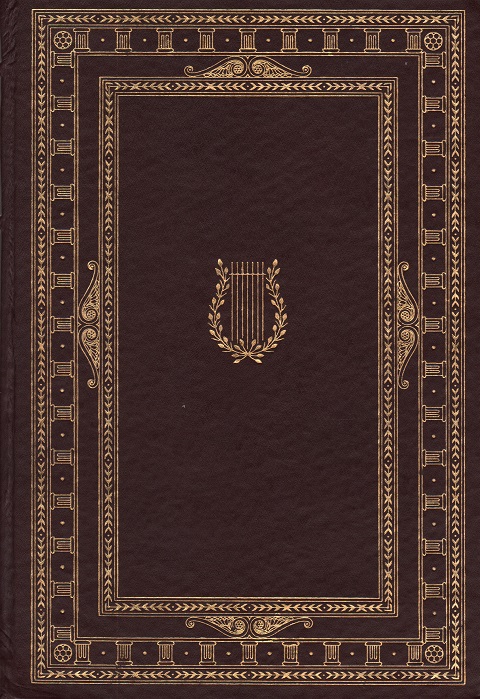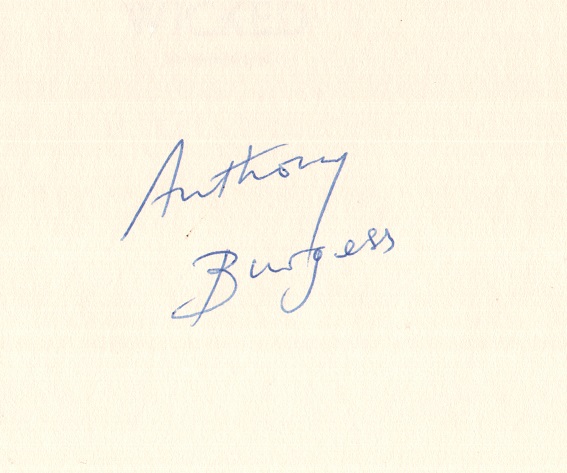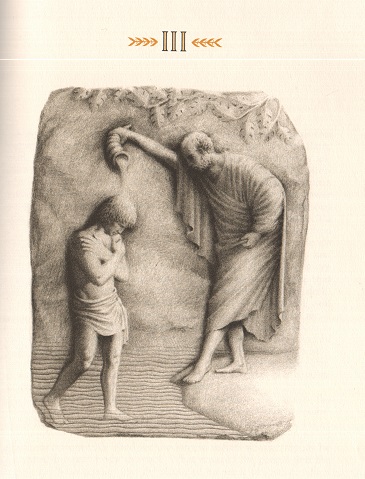Details
| Autor | Burgess, Anthony |
|---|---|
| Herausgeber | DeFelice, Ronald (Illustr.) (Hg.) |
| Verlag | The Franklin Library |
| Auflage/ Erscheinungsjahr | 1985 |
| Format | 16,5 × 24 cm |
| Einbandart/ Medium/ Ausstattung | Ledereinband mit Goldverzierung und Goldschnitt |
| Seiten/ Spieldauer | 379 Seiten |
| Abbildungen | Mit einer Titelzeichnung und weiteren 5 Abbildungen nach Ronald DeFelice |
| SFB Artikelnummer (SFB_ID) | SFB-006284_BP |
Limitierte Ausgabe in sehr guter Erhaltung aus der Franklin Library in rotbraunem Ledereinband auf 3 falschen Bünden, mit reicher Rücken- und allseitiger Deckelvergoldung sowie Dreiseitengoldschnitt. Unser Exemplar von Antony Burgess auf dem Vorsatz signiert.
Zu dieser Vorzugsausgabe
»This novel deals with a period of European history which everybody thinks he knows well. I mean the tempestuous decades after the death of Christ, when a new creed struggled to make itself known against various kinds of Opposition - the punitive suspicions of an imperial power, the indifference of pagan intellectuals, the bigotry of an established faith, and the primitive superstitions of devil-worshippers. The whole story is set out succinctly in a remarkable little book called The Acts of the Apostles, written by a Greek physician named Luke. Most people know this book so well that they think it tells the whole truth about the spread of the Christian faith. But what Luke does not tell he assumed he could take for granted—what was happening in Rome while the Nazarene creed was fighting for its life in Jerusalem, the immense magical power of the ancient goddess of fertility - Ashtaroth or Diana of the Ephesians - and the differences of temperament and tradition which split the Palestinian Jews from their brothers of the Greek islands. I try to tell these things through an imaginary chronicler whose father has already recounted the story of the founder of the faith, a story I presented in an earlier novel entitled Man of Nazareth.
Now all the above sounds like a course in religious instruction, while the duty of the novelist is chiefly to entertain. A lot depends on what we mean by entertainment. On one level, the early history of Christianity is very considerable entertainment. It has fights, shipwrecks, cruelty in the imperial arena, good men and bad men. But it also has an element few people would wish to acknowledge, since it seems to have little to do with sin and piety, damnation and redemption: I mean comedy. The great comedian (may He forgive me for the blasphemy) is God. He makes the division between the Jews and the Christians, who began merely by being a special sort of Jews, depend on battles about circumcision and dietary laws. Poor Simon Peter, wanting his dinner and dozing off on the roof of the house of a tanner (he cannot stand the smell of the tanner's trade and so seeks fresh air), dreams of eating pork and lobster. He wakes to be summoned to the baptism of a Roman centurion, a pagan who has an unshorn prepuce and is quite willing to wash down non-kosher beef with goat's milk. It is a comic situation, and not the only one. Paul's journeys are dedicated to shouting down a many-breasted goddess who blesses temple prostitution and presides over joyful promiscuity. The Greeks of Athens reject Christianity because they are philosophers and want a rational first cause. Because the Romans respect them for their political gifts, they leave the Greeks to rule themselves and hence, while Christians are being thrown to the lions elsewhere, permit them to have Christianity if they want it. It turns out that they do want it.
The biggest black joke of them all is that Rome, the centre of imperial paganism and bloody persecution, should be preordained to be also the centre of the new faith. This involves the destruction of Jerusalem by Titus—a minor matter to a Creator who can always make good the wiping out of an entire population by speeding up the breeding urge. If all this sounds irreverent, please remember that the irreverence is not mine but that of my narrator. An author doesn't necessarily have to agree with what his characters do and say.
This novel completes what I think of as my Christian diptych, a work undertaken as much to divert as to instruct. Americans, I think, being still impregnated with much of the ethos of the Pilgrim Fathers, rate Instruction higher than diversion. But to divert means to force a reader on to a road rather different from the one he travels every day, to impel him to take a new look at the world. Diversion thus means enlightenment. Here I am trying to throw light. If the light is too blood-coloured for some readers, they must blame history and not its interpreter.« (Aus dem Vorwort des Autors)
Über den Autor
Anthony Burgess was born in Manchester, England, in 1917. After studying music and languages in Manchester (during this period he wrote a symphony), he joined the Army in October, 1940, and served for three years.
Mr. Burgess did not take seriously to writing until his late thirties. His main ambition was to be known as a composer, and he has produced and had performed musical works of widely differing types. In 1954 he aeeepted a post as Education Offi-cer in the Federation of Malaya, where he remained until the Coming of independence.
Writing has now become a full-time job for Mr. Burgess. He plans his works much as he used to plan fugues and sonatas. He insists that literature is primarily an audi-tory art, and he intends that his novels should be read with the ear rather than the eye. Inevitably, he greatly admires James Joyce, though little of Joyce's influence is apparent in his own work.
Lieferbarkeitshinweis
In der Galerie der SFB - Abteilung Buchkunst - ist diese Arbeit Burgess`als ein annähernd verlagsfrisches und entsprechend sehr gut erhaltenes Exemplar dieser edel gerbeiteten und limitierten Edition und MIT der SIGNATUR DES AUTORS auf dem Vorsatz verfügbar. - Ausnehmend selten!




![Clockwork Orang -e [Uhrwerk Orange]](../../getmedia.php/_media/sfb/201702/9890v0-orig.jpg?w=240)
Kommentare
Schreiben Sie den ersten Kommentar!
Neuer Kommentar
Bitte beachten Sie vor Nutzung unserer Kommentarfunktion auch die Datenschutzerklärung.